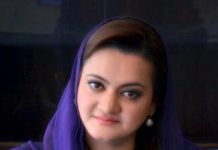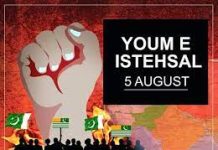ISLAMABAD: The Supreme Court of
Pakistan on Thursday granted time to
Pakistan Tehreek-e-Insaf (PTI) counsel to consult party’s leadership for its stance over the formation of commission under the Election Commission of
Pakistan (ECP) to determine whether the party’s foreign funds were acquired through prohibited sources.
The permission was granted after Advocate Anwar Mansoor Khan, representing PTI, appeared before a three-judge bench headed by Chief Justice Mian Saqib Nisar, and requested the court for more time for consulting party leadership, including chairman Imran Khan, over the matter.
The three-judge bench, whose other two members are Justice Umar Ata Bandial and Justice Faisal Arab, resumed the hearing of the petition filed by
Pakistan Muslim League Nawaz (PML-N) leader Hanif Abbasi, seeking the disqualification of P
TI Chairman Imran Khan.
PTI’s counsel told the bench that he had not been able to consult his client as the party’s chief was not in the city, adding that time was required to take instructions.
However, in relation to the jurisdiction, he contended th
at the application made by a third party was not permissible under the law, adding th
at the federal government had the authority to probe into foreign funding for political parties and after the determination it could refer the matter to SC.
The counsel maintained that an individual alone could not challenge the accounts of a political party. He added that ECP was neither a court nor a tribunal adding that ECP could only look into matter if the party was funded by a foreign government.
He contended that Article 6 of the Political Parties Order (PPO) 2002 related to money received in
Pakistan domestically except from money received by foreign government.
He further said that Article 6 of PPO 2002 was distinct from Article 2-c and Article 15 of the said order.
“Articl
e 6 states th
at the parties may accept contributions and donations only from individuals while any contribution made, directly or indirectly, by any foreign government, multinational or domestically incorporated public or private company shall be prohibited,” he said.
“Likewise Article 2 (c) of the order states that a foreign-aided political party means a political party which has been formed or organised
at the instance of any government or political party of a foreign country or affiliated to or associated with any government or political party of a foreign country or receives any aid, financial or otherwise, from any government or political party of a foreign country, or any portion of its funds from foreign nationals,” he said.
The counsel contended that Article 6 of PPO 2002 would be read with Article 17 (2) of the Constitution, which states about freedom of association.
The counsel argued th
at the penalties provided for both provisions including Article 6 and Article 2 (c) were distinct while jurisdictions were also
different without overlapping each other.
Advocate Mansoor argued th
at the allegation in petition was regarding foreign funding which was not domain of ECP, but the federal government.
Justice Umar Ata Bandial told the lawyer that granting more time for consultation did not mean th
at the court had agreed with the argument regarding distinctions of provisions.
The court will resume the hearing on May 23.













